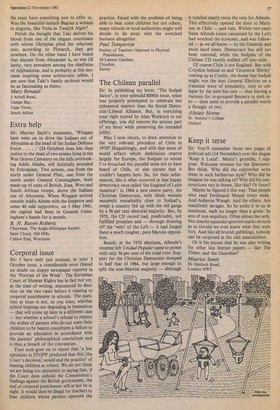The Chilean parallel
Sir: In publishing my letter, 'The Sodpal factor', in your splendid 8000th issue, space was properly preempted to celebrate less ephemeral matters than the Social Democrat/Liberal Alliance. But, in exercising your right (noted by Alan Watkins) to cut offerings, you did remove the serious part of my letter while preserving the intended jollity.
May I now return, to draw attention to the very relevant precedent of Chile in 1970? Disquietingly, and with that sense of world affairs which Jenkinsites reserve largely for Europe, the Sodpals to whom I've broached this parallel seem not to have heard of Chile, or else riposte that it couldn't happen here. So, for their information, this is what occurred in that happy democracy once called `the England of Latin America': in 1964 a new centre party, the Christian Democrats, with ideals mutatis mutandis remarkably close to Sodpal's, swept a country fed up with the old gangs by a 56 per cent electoral majority. But, by 1970, the CD record had, predictably, not fulfilled promises and — through draining off the 'wets' of the Left — it had forged there a much tougher, pure Marxist opposition.
Result; at the 1970 elections, Allende's extreme left Unidad Popular came to power with only 36 per cent of the total vote. Support for the Christian Democrats slumped to half that of 1964, but large enough to split the non-Marxist majority — although it totalled nearly twice the vote for Allende. This effectively opened the door to Marxism in Chile — and ruin. Within two years Saint Allende (since canonised by the Left) had wrecked the economy, and was followed — as we all know — by the Generals and more hard times. Democracy has still not been restored; while the Sodpals of the Chilean CD mostly sodded off into exile.
Of course Chile is not England. But with Croydon behind us and `Grunwick Shirley' coming up at Crosby, the threat that Sodpal might win the next General Election on a transient wave of popularity, only to collapse by the next-but-one — thus leaving a vacuum for re-grouped Bennery to rush into — does seem to provide a parallel worth a thought or two.
Alistair Horne
St. Antony's College Oxford










































 Previous page
Previous page